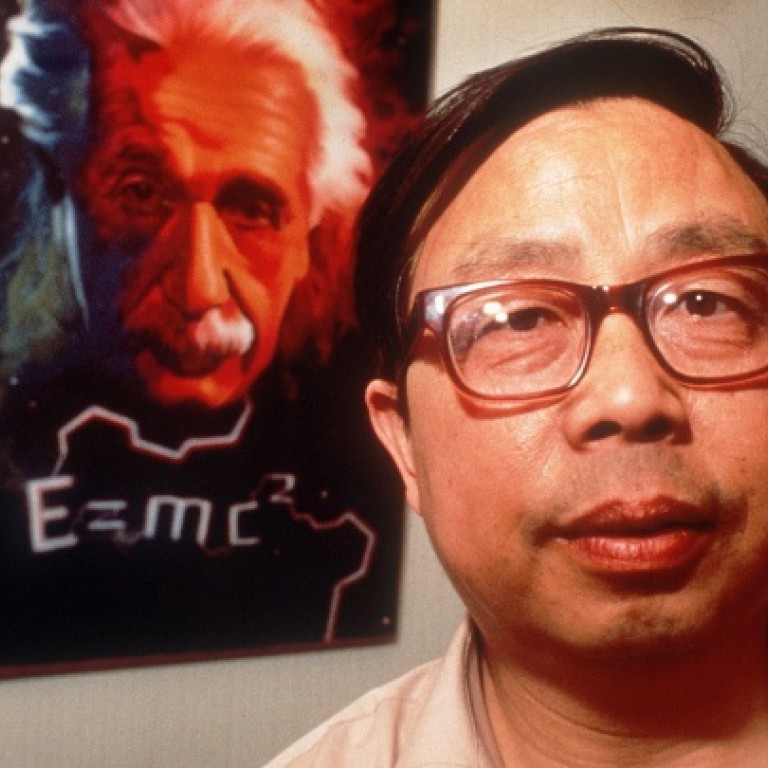
Fang Lizhi uses posthumous autobiography to deny any role in Tiananmen protests
Prominent astrophysicist sheltered by US embassy before being helped to flee China uses autobiography to deny any role in Tiananmen protests
Fang Lizhi was not a "black hand" behind the pro-democracy movement in 1989, he says in a newly published posthumous autobiography.
Rather, it was his innate character as a scientist - perseverance in pursuing the truth - that led him to be named China's most-wanted man and forced him into exile, he writes.
"I hope my autobiography will help me to say clearly how I was guided by [the spirit of] science and democracy to the endless path of being the most-wanted man [by the Chinese authorities]," the book's cover quotes the distinguished astrophysicist as saying.
The book goes on sale in Hong Kong on Friday.
Fang, who began writing the book more than 20 years before his death in April last year, reiterates in it his simple message that "democracy is not a favour bestowed from above, but should be won through people's own efforts".
The words come from a famous speech he made in 1986 while vice-president of the University of Science and Technology in Hefei . The speech became an inspiration for the student movement three years later.
A public letter that he wrote on January 6, 1989, urging Deng Xiaoping to release all political prisoners, including Wei Jingsheng , in a "massive amnesty" to celebrate the 40th anniversary of the People's Republic of China, only annoyed the paramount leader further, Fang writes.
However, he says he only wanted to express an honest opinion as a scientist about the development of China. "We learn from science [to be] open, honest, and fearless," he writes.
Fang stresses that politics was never his cup of tea.
Besides a sole public appearance to persuade Anhui students to end street demonstrations in 1986, Fang says he tried his best not to show up at student gatherings, especially the remarkable two-month-long Tiananmen protests, which ended with a bloody military crackdown on June 4, 1989.
After the incident, Fang and his wife, Li Shuxian , a Peking University physics professor, found themselves at the top of the authorities' list of "black hands" behind the protests.
"If there was something we had contributed to the [democratic] movement, it might be our simple [democratic] message, which had struck a chord … with the public," Fang writes.
On June 5, 1989 the couple went to the US embassy, accompanied by the American professor Perry Link. They were initially turned away by Washington's acting ambassador, Raymond Burghardt, but the US envoy made a midnight call a few hours later welcoming the couple to return to the embassy "as guests of President George H. W. Bush".
The couple were taken to the US mission in a bullet-proof car and told they could stay as long as they needed.
Living in a sealed bungalow, a former clinic just metres from a Chinese armed-police checkpoint, the couple started their 385-day lockdown behind curtained windows. They never saw the daylight and Fang says that besides US ambassador James Lilley, few at the embassy knew of their whereabouts.
Security was a concern, in part because the Chinese staff at the embassy had all been approved by the Foreign Ministry.
In the first three weeks, the couple were worried that the PLA might burst into the embassy to take them away or even set fire to the complex to create "accidents" in attempt to kill them. But Lilley comforted them with news that Washington had warned Beijing that any intrusion into the embassy would result in diplomatic ties being severed.
After the crackdown, Washington suspended top-level exchanges with Beijing and introduced economic sanctions and an arms embargo. But bilateral ties were maintained.
While many senior Chinese officials condemned Washington for offering political asylum to Chinese students still in the US, their own spouses and children were flocking to the embassy to apply for visas, Fang writes.
He cites as an example Teng Teng , then deputy director of the state education commission, who summoned Lilley to his office and expressed Beijing's condemnation. But less than an hour later, Teng called Lilley to ask for a visa for his wife, who wanted to meet their four children in the United States.
Besides Teng, relatives of Yuan Mu , a spokesman for the State Council in 1989, then those of former president Yang Shangkun all applied for US visas, Fang writes. A US embassy clerk even deliberately asked an applicant loudly in Putonghua during an interview whether they were a relative of Yuan Mu, to embarrass them in front of other visa applicants in the queue.
The couple were taken good care of at the embassy, Fang writes, adding that a famous dentist from Tokyo was sent to their room to treat Li's toothache.
Their communication with the outside world was never cut, Fang writes, with many well-known universities and observatories sending honours and job offers while trying to convince the couple to leave China as soon as possible. But Fang turned down all such suggestions.
He refused to make a "confession" to Beijing in exchange for his freedom because, he insisted, he had never breached any law or democratic principle of the Chinese constitution.
After negotiations involving Lilley, former president Richard Nixon and ex-secretary of state Henry Kissinger, Beijing agreed to "expel Fang and Li on medical parole" in June 1990. They were sent to Britain on a US military aircraft a week later. Six months after that, they arrived in the US.

